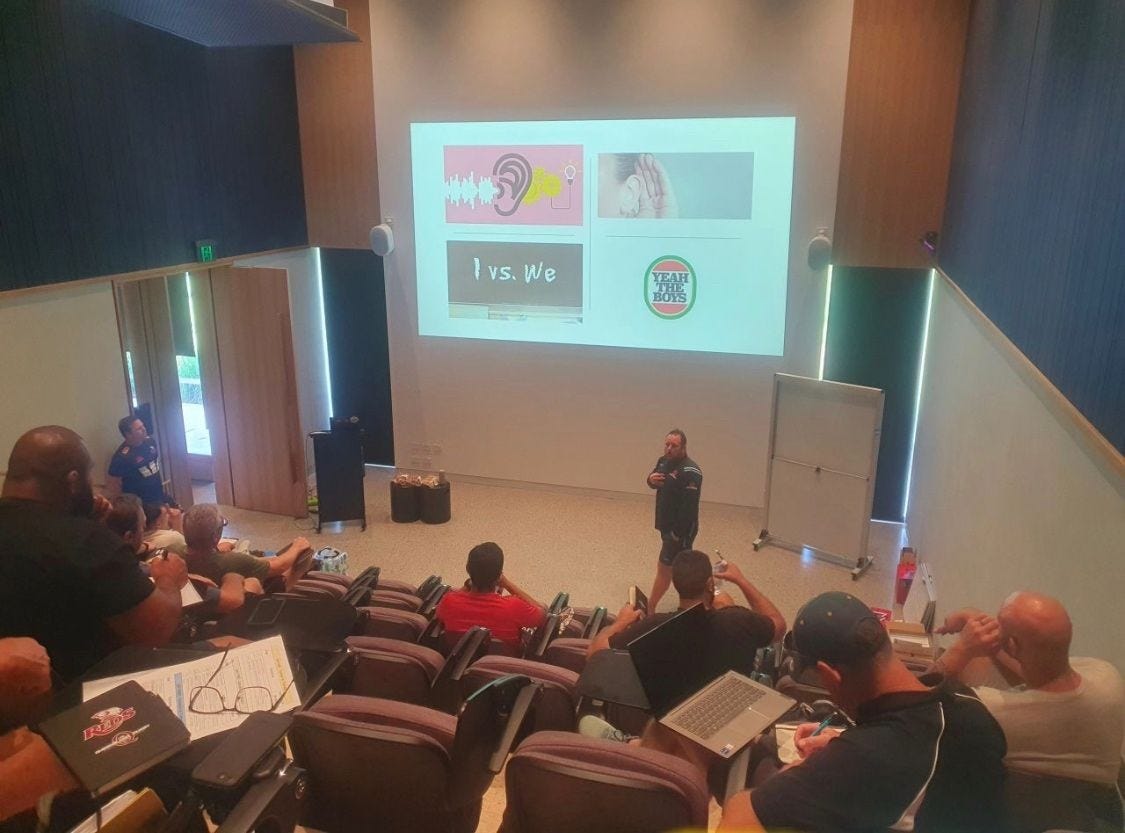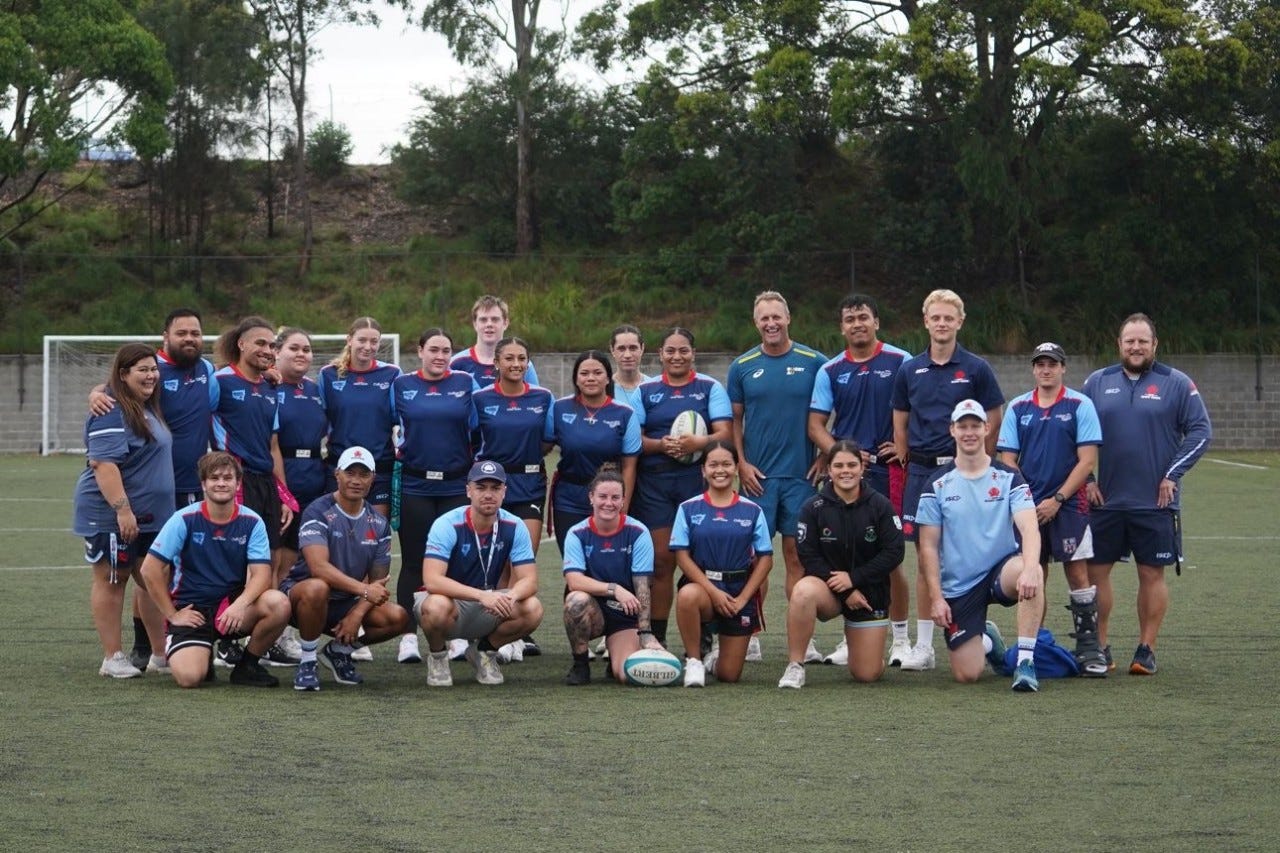Coaching the coaches
Owain Lloyd Roberts is the Coach Development and Education Manager for NSW Rugby Waratahs. He chats about coach development, fostering coach engagement and growing female coaches.
I am the Coach Development and Education Manager for NSW Rugby Waratahs. The role varies in what it entails, from coordinating our formal and informal courses across the state as well as our deliverers, both internal and external.
I’m part of working groups that write curricula, I’m out and about watching and observing coaches with a bit of mentoring. Basically, if there’s something happening with a bit of coach development, it’s usually part of the role.
I’m also fortunate that I get asked to take the odd trip around Australia to help, review, deliver. We’re a pretty collaborative group across the country. A trip to Fiji to help World Rugby delivery is always nice too!
There are some challenges within coach development. This includes ensuring that our coaches are engaged in some of our systems and wanting to develop. There are always some who have that ‘know it all’ attitude and what can the ‘Governing Body’ do for me? I love winning those coaches around!
There are some questions that I often think about:
Are our coaching ratios good enough? Do we have enough? How do we engage more?
Are we representative enough? Do we look like our playing population? Who are our role models?
Do we have enough people that are good and that are developing in their relative spaces?
Are we doing enough to help? Where do we say: “we can’t offer all of that”? Individuals need to chase their own development too.
We also have a whole host of stakeholders here too, are we supporting them well enough? What do they actually need and want?
How do we support coaches in their own environments more often? (That’s the big question for me at the moment.)
Developing female coaches
We have two full time employees whose roles are based around the participation of women and girls in the game. They’re a wonderful resource for us.
We’ve tried a lot of different projects. It’s an area that we’re constantly improving in, but would love to see faster growth.
Female only coaching courses having been both really well attended and poorly attended. Finding some funding to develop more female coaches has been our ‘game-changer’ recently.
We’ve been able to be far more targeted including telling stories about some successes from coach placements.
On the back of a conversation with yourself (Jess), we have set up peer groups and avenues for female coaches to connect and support each other.
We’ve also worked with a younger age group. Our female demographic is growing, quickly, lots of teenage girls are getting in to the game.
They are young people with no ego, no bad habits, who love it and who want to learn. Getting in to schools has been hugely enjoyable and seeing them coach within clubs has been even better.
Working towards a good environment for learning
A good coach learning environment is one that is open, honest, supportive and safe.
The more that we can connect, talk, challenge each other, praise each other (praise is often seen as too awkward) work on ideas with each other, the better.
Personally, if we want our coaches to be comfortable with all of that, I think getting a bit weird early on is really important.
Getting people out of their comfort zone, with some fun, non-rugby activities brings them out of their skin nice and early.
They work out pretty quickly that they’re in the same boat. That helps start the deeper sharing.
Trust is a major part of our smaller group and 1-2-1 work. Getting to know our coaches and them getting to know us is really important.
Having the view that I don’t have all the answers is helpful for the work. We need to find solutions, thoughts and ideas together. It’s vital to take the coach on their own journey.
We’ve recently updated our curriculum. We’ve moved away from the old Level hopping (from 1 to 2 to 3 to 4). We’re a more purposeful now. Coaches have more agency around their development.
Coaches will have ‘Core Courses’ that are relevant to them and what they’re coaching (as well as what they’re moving in to) with some supplementary courses and learning events that suit them, their needs and their interests.
The hope is that coaches choose their own path, whilst ensuring that good practices and habits are part of that along the way.
There is work to do around the extra learnings and CPD events, but the feedback so far has been excellent.
We also offer some bespoke club/school things as well, they are hugely relevant to those institutions.
We foster peer-to-peer learning by giving coaches the opportunity to do so. These opportunities are on-course, post-course and through peer groups.
Ultimately, creating peer-to-peer learning is marketing:
Are there consistent prompts along the way to get us to reach out to each other?
Are there consistent prompts along the way to get us to collaborate and work on a thought?
Are there consistent prompts along the way to get us to get together, watch a game and tear it apart?
We can give opportunities and we can do exercises to foster it, but ultimately, coaches are the ones who make the jump to work with others. The better coaches, I would argue, consistently do that.
How do you measure success?
Measuring success within coach education is complex. I think it has both objective and subjective outcomes and experiences.
Metrics like player and coach churn help. Are our players returning? That is always a good measuring stick.
The question about how we measure success has got me thinking. I’ve listed some of my thoughts. Some things we don’t currently do, some of these we do and some we will do in the future.
Knowledge Acquisition - Pre- and Post-program assessments
Self-Reflection and Evidence of a Growth Mindset - Evidence of improved self-awareness; reflection journals etc
Observed Practice - Video or live observations using criteria
Session Planning Quality - Improvements in session planning that reflects clear outcomes, progression and purpose.
Player Engagement and Development - Players enjoying and being challenged within the environment.
Environment - Safety to take risks, fail, and grow within the environment.
Coach Retention - Are coaches continuing to coach after the course? Are they progressing to higher levels?
Coach Progression - Do coaches go on to mentor others, lead programs, or contribute to their clubs and communities?
Surveys - How do coaches rate the experience, facilitators and content?
Peer Collaboration and community building: Are networks forming among coaches? Is there ongoing sharing of practice?
Did you know there’s a subscription option for Coaching Care Creativity? Nothing is behind a paywall so your subscriptions or coffee clicks can help keep the content going. The subscriptions are £5 a month or £50 for the year. You can also buy me a one-off coffee for just £5.




